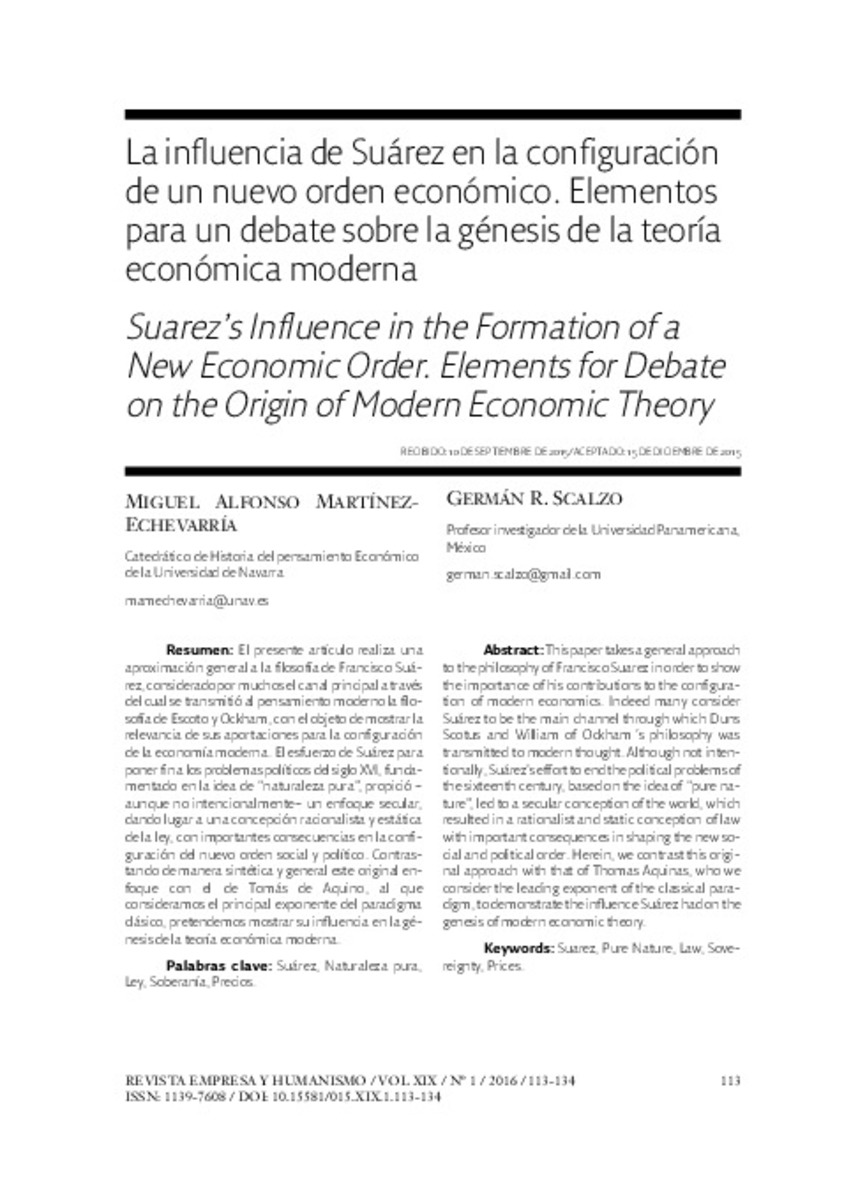Full metadata record
| DC Field | Value | Language |
|---|---|---|
| dc.creator | Martínez-Echevarría-y-Ortega, M.A. (Miguel Alfonso) | - |
| dc.creator | Scalzo, G.R. (Germán Roberto) | - |
| dc.date.accessioned | 2016-10-13T12:10:22Z | - |
| dc.date.available | 2016-10-13T12:10:22Z | - |
| dc.date.issued | 2016 | - |
| dc.identifier.citation | Martínez-Echevarría, Miguel Alfonso; Scalzo, Germán Roberto. (2016) ""La influencia de Suárez en la configuración de un nuevo orden económico. Elementos para un debate sobre la génesis de la teoría económica moderna"" Revista Empresa y Humanismo, Vol. XIX nº 1, 113-134 | es_ES |
| dc.identifier.issn | 1139-7608 | - |
| dc.identifier.uri | https://hdl.handle.net/10171/41762 | - |
| dc.description.abstract | El presente artículo realiza una aproximación general a la filosofía de Francisco Suárez, considerado por muchos el canal principal a través del cual se transmitió al pensamiento moderno la filosofía de Escoto y Ockham, con el objeto de mostrar la relevancia de sus aportaciones para la configuración de la economía moderna. El esfuerzo de Suárez para poner fin a los problemas políticos del siglo XVI, fundamentado en la idea de “naturaleza pura”, propició – aunque no intencionalmente– un enfoque secular, dando lugar a una concepción racionalista y estática de la ley, con importantes consecuencias en la configuración del nuevo orden social y político. Contrastando de manera sintética y general este original enfoque con el de Tomás de Aquino, al que consideramos el principal exponente del paradigma clásico, pretendemos mostrar su influencia en la génesis de la teoría económica moderna. | es_ES |
| dc.description.abstract | This paper takes a general approach to the philosophy of Francisco Suarez in order to show the importance of his contributions to the configuration of modern economics. Indeed many consider Suárez to be the main channel through which Duns Scotus and William of Ockham´s philosophy was transmitted to modern thought. Although not intentionally, Suárez’s effort to end the political problems of the sixteenth century, based on the idea of “pure nature”, led to a secular conception of the world, which resulted in a rationalist and static conception of law with important consequences in shaping the new social and political order. Herein, we contrast this original approach with that of Thomas Aquinas, who we consider the leading exponent of the classical paradigm, to demonstrate the influence Suárez had on the genesis of modern economic theory. | es_ES |
| dc.language.iso | spa | es_ES |
| dc.rights | info:eu-repo/semantics/openAccess | es_ES |
| dc.subject | Suárez | es_ES |
| dc.subject | Naturaleza pura | es_ES |
| dc.subject | Ley | es_ES |
| dc.subject | Soberanía | es_ES |
| dc.subject | Precios | es_ES |
| dc.title | La influencia de Suárez en la configuración de un nuevo orden económico. Elementos para un debate sobre la génesis de la teoría económica moderna | es_ES |
| dc.type | info:eu-repo/semantics/article | es_ES |
| dc.identifier.doi | 10.15581/015.19.3707 | es_ES |
Files in This Item:
Statistics and impact
Items in Dadun are protected by copyright, with all rights reserved, unless otherwise indicated.






